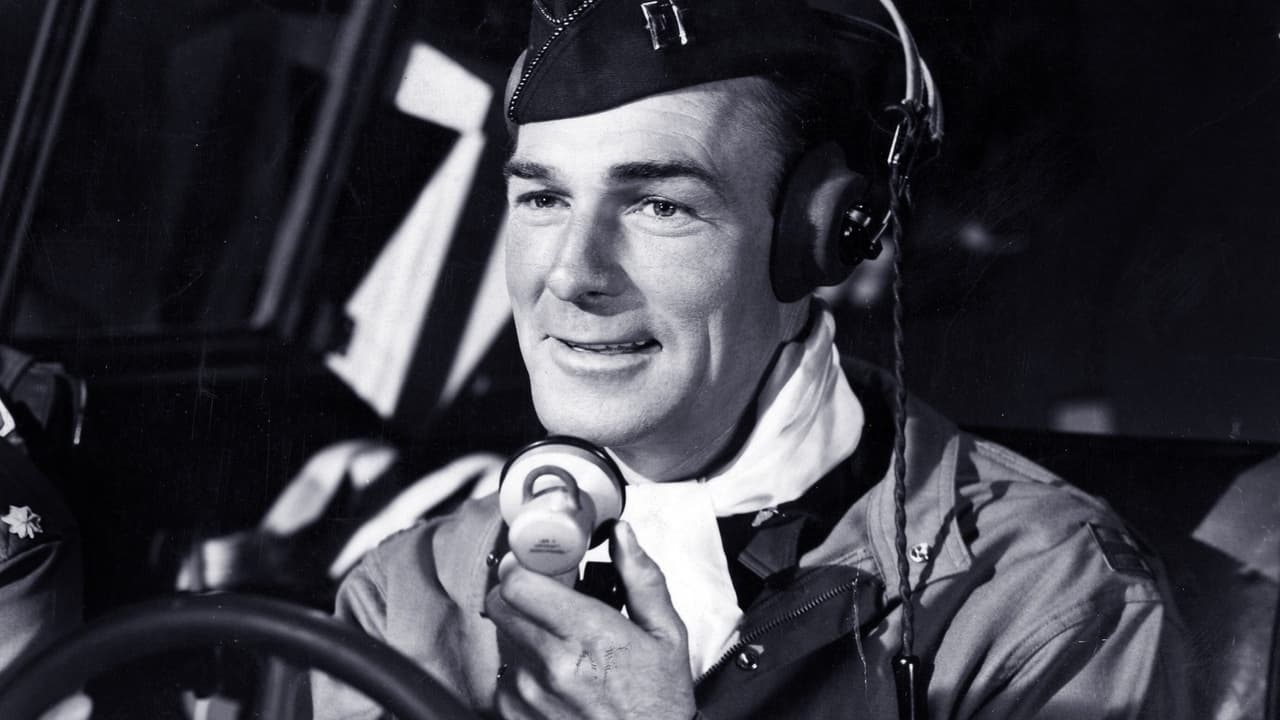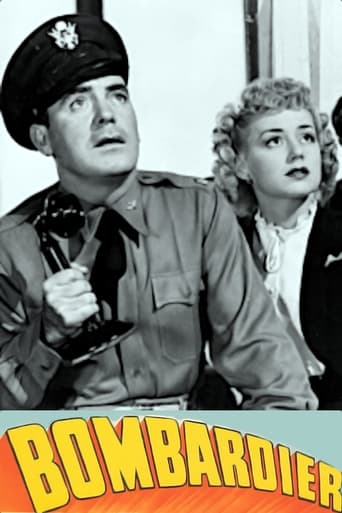

Directed by Richard Wallace, with writing credits for Martin Rackin (story) and John Twist (story and screenplay), this World War II propaganda film focuses on the technical role of the title job. It features an all star cast including: Pat O'Brien, Randolph Scott, Anne Shirley, Eddie Albert, Walter Reed, Robert Ryan, Barton MacLane, and Russell Wade, who played a similar role in The Bamboo Blonde (1946).The film begins with a monologue (by Brigadier-General Eugene L. Eubanks himself) emphasizing the importance of the bombardier, and the vision it took to create, train, and staff the job prior to World War II so that we were prepared to join the fight. Major Chick Davis (O'Brien), with his "golden goose" sighting equipment, challenges dive bomber Captain Buck Oliver (Scott) to see whose method will be most effective in the conflict, should the United States choose to enter the war. Though Buck misses the target, Chick hits it from 20,000 feet, convincing his critics to fund a training school (actually in Kirtland Field, Albuquerque) in New Mexico.The mythical site is reported to be an airfield owned by a former, and now deceased, dive bomber named Hughes, whose daughter Burton (Shirley) and son Tom (Albert) still work there. Gruff Chick arrives to find an environment too cozy for the Army Air Force, because of Burton's woman's touch, and has Sgt. Dixon (MacLane) rough it up a bit. Buck arrives to help, as one of the pilots for the bombardiers, and is greeted by Burton, who he evidently has been dating. Apparently Tom has enlisted as a bombardier too, based on the fact that his best friend, a star football player, Jim Carter (Reed) had joined.The film then spends quite a bit of time giving an overview of the education, which begins with extensive classroom and other ground training before the students are ever taken up in a plane. Besides Tom and Carter, some of the other recruits include Joe Connors (Ryan), Chito Rafferty (Richard Martin), and Paul Harris (Wade). Some of the pupils do better than others: Connors is distracted until we learn the reason - someone had been offering him money for one of the "golden goose" sighting apparatuses. Chick uses Connors to catch the culprits. Chick must also fight for his men to be treated with respect in the Army, e.g. to get commissions making them equal to their pilots. Scott's character Buck serves the function of the skeptical pilot trying to "steal" the best of Chick's recruits and as one who must be convinced of the bombardier's value.Shirley's character, as the lone credited female in the film, is not only a romantic interest for the competing Buck and Carter (and even to the smallest degree, Chick) but also serves to "soften up" the tough Chick a bit, acting as his sounding board, loyal employee, and voice of reason. Joan Barclay does appear, uncredited, as a romantic interest for Rafferty, however briefly. The most dramatic, and character revealing moments in the film, revolve around Arnold's character, who must justify why Chick and the Army board should keep him given his fear of jumping out of a disabled plane AND later is doomed to a tragic fate.The final phase of the film is the realization of all the extensive training, after it is learned that the Japanese have bombed Pearl Harbor.Though this film received an Academy Award nomination for Special Effects, they are vastly inferior to those in another film nominated film that same year, Air Force (1943).There is, of course, a moment late in the film when Buck sees the light and appreciates the role of the titled soldier. The film ends, oddly enough for the time, with its credits.
... View MoreThis semi-documentary war drama is a face paced look at the lives of the pilots whose job it is to measure distance from the air to make sure the bombs they drop hit their targets. It even starts off like a documentary with no real credits (those are held off until the end) and explains in good detail of what these extremely brave men do, at great risk to their lives, but at even greater risk to their country if they didn't. The first half covers their training while the last part takes us on one of their missions, a dangerous one that has them falling right into the camp of the enemy. That sequence had me riveted to my television in total awe to the technical impressiveness of it all and the horror of these men's situation.But no matter how much their own lives are in peril, they get the goods on the enemy, never once giving into the tortures and utilizing a popular children's story in giving away American "secrets". The cast is superb, and includes Pat O'Brien (as the trainer), Anne Shirley (well utilized as the only major female character in a men's story), Robert Ryan, Randolph Scott (who gets a great final moment) and Eddie Albert as a trainee who meets a most horrifying destiny in the most shocking moment of the film. A rousing song of the Bombardiers is a light-hearted moment that is poignant and fun but never corny.
... View MoreThis 1943 film by RKO is among several that Hollywood and/or the War Department put out during the early months and years of World War II. It's a mix of genres. The war action comes at the end. A docu-drama style tells the story of the bombardier school and training. Hollywood adds its usual touch of romance, but lightly. The drama is there – even in the training. And, of course, it's a propaganda film. Propaganda surely had its place in WWII – to help sustain public morale, build support for the U.S. cause and efforts, and give the public a picture of some of the troops, training, and campaigns. "Bombardier" tells and shows us the early days of training for this new position in the Army Air Forces – precursor of the U.S. Air Force. As such, it's a good educational piece for the public, then and now. The men who went into combat in different roles weren't tossed together and sent into combat. They were trained first. And for some fields, the training was highly specialized and detailed. This film shows very well that detail, study and science that went into the training of bombardiers. These men indeed played a critical role in destroying enemy armament production, fuel depots and major supplies – and in so doing, helped end the war much earlier than it would have otherwise concluded. Many have said it since the first attribution to Civil War Gen. William T. Sherman, that "War is hell!" But once a nation is in a war, it should do everything possible to end it as soon as possible. Many war movies have been made, especially about the two "great" world wars of the 20th century. They have variously focused on the action of troops in battles, assaults from the sea, naval engagements or air combat. Most give us a picture, however much Hollywood may "tweak" it, of the human conditions, relationships, and characters. Often times they include the strategic plans of real battle scenes. These are the things that most interest people, or "entertain" audiences for this genre. But films such as "Bombardier" add another value in educating and informing the public of what went into the readying of our nation for war, and our ability to win and end it as soon as possible. As an Army paratrooper veteran, I enjoy learning about the "how-to" that men and women learn in the different combat and support specialties of our armed services. People who approach war movies in a similar frame of mind will be much more likely to enjoy them. I highly recommend "Bombardier" as an informative, action-filled and historical war movie.
... View MoreThis war drama from RKO Radio can't help but appear dated, but is evocative of the mindset in the early '40s. An entertaining piece of propaganda with just enough war action and actually features some good acting. The two primary stars Pat O'Brien and Randolph Scott argue over methods of training for the war effort. Scott playing Capt. Buck Oliver, who is adamant about recruiting pilots; O'Brien stars as Major Chick Davis pushing the training of pilots in high altitude precision bombing. The latter becomes head instructor at a flying school inherited by "Burt" Hughes(Anne Shirley). Davis is surprised when Oliver arrives as a flight instructor and insists he complies with the program of bombing training. Sub plots involve the competition for the affections of Miss Hughes; and the arrival of her brother Tom(Eddie Albert)as a student. Intense and grueling aerial footage. Richard Wallace directs; other players include: Robert Ryan, Richard Martin, James Newill, Barton MacLane and Brigadier General Eugene L. Eubanks. And in smaller roles are: Paul Fix, Eddie Dew and Hugh Beaumont.
... View More